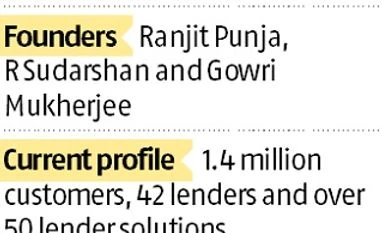Rahul, a sales representative with a multinational company, wanted to take a loan. His application was rejected and on enquiry he found his credit rating was poor. That is when he heard about a website that helped customers improve their credit rating through informed decisions. He availed the service and regained his eligibility to avail the best rates from lenders.
The website was CreditMantri, a Chennai-based financial service company that offers credit rating and lending support solutions to customers. The company was established by three banking experts to change the way credit is delivered in India using technology.
On March 1, 2017, the company announced the completion of its Series B round of funding of $7.6 million from Quona Capital, Newid Capital and existing investors, including Elevar Equity, Accion and IDG Ventures India. Although launched in March 2012, the company started to grow after May 2015 when it raised a Series A round of funding of $2.5 million from IDG Ventures and Accion Ventures.
CreditMantri’s perfect balance of finance and technology was the draw for investment, said Ganesh Rengaswamy, co-founding partner, Quona Capital. He added CreditMantri had a unique solution that blended traditional and alternate data to fundamentally change the consumer credit landscape and accessibility to critical financial services for the underserved.
CreditMantri’s co-founders, Ranjit Punja, R Sudarshan and Gowri Mukherjee, have all worked in the banking sector. After raising the Series A round of funding, the company set itself a target to have 100,000 customers in a year’s time. Growth far exceeded expectations and now, after almost 20 months, CreditMantri’s customer base is 1.4 million. The main activity of the company is to profile customers and use those profiles in the best way to service them. CreditMantri creates its profiles using a bureau report and provides the customer his credit score and analysis of his credit health. This attracts a large number of customers to its website.
The credit score is improved with social, government and bank data. Having profiled a customer into one of three baskets, Credit Healthy, Credit Challenged and New to Credit, CreditMantri offers products and services for each segment. It caters to Credit-challenged customers in need of credit improvement and score-building services. Credit-healthy customers who want to save money in existing or future borrowings are also supported. For those new to credit, CreditMantri offers structured loan products from a variety of lenders.
It also works with lenders to know their preferences in credit profiles. It matches lenders with borrowers and this results in high rates of conversion of enquiries into loans. Punja claims this is a unique offering of the company. CreditMantri has partnerships with Equifax, a US-based credit reporting agency, and various Indian financial institutions.
The company also offers the same profiling service to banking and non-banking customers in its business-to-business model. If a lender receives an application for a loan and if it cannot confirm a borrower’s details from the application CreditMantri offers information to the lender from its database. This could be for verification of employment, residence, or salary, with information collected with the consent of the customer.
Of CreditMantri’s 1.4 million customers, over 60 per cent provide access to over 2,000 credit-relevant data points in order to build their credit profiles. The company caters to 42 lenders and offers over 50 lender solutions, such as resolving past debt issues or tailor-made products where evaluation and verification is done exclusively through the website. Customers are mostly individuals with small businesses. “We have not started evaluating large companies, which we may start doing later,” Punja says.
The revenue model is mostly lender-faced. CreditMantri offers credit scores and credit analysis for free and if the customer wants anything resolved, a small fee has to be paid. All other operations, such as referral and B2B profiles, are lender-faced. All the profiling is done with customer consent.
Way forward
The Series B round of funding will mostly go into scaling up the business, acquiring more customers and building future functionality. The company has a target of increasing its customer base to 6 million in 18 months. It is also looking at becoming cash positive in 18 months. Demonetisation, the emphasis on digital transactions, and Aadhaar and GST implementation will help the company to grow. But any sudden adverse change in regulation could be a challenge.
According to one of CreditMantri’s investors, among the major challenges is acquiring new customers and shifting the power of influencing credit scores from credit bureaus to customers.
EXPERT TAKE
There are around 57.7 million small business units in India. Most of these are small proprietorships with minimal physical assets and no credit history. Given that banks often lend capital based on asset-backed collaterals, they often miss out on the massive lending opportunities in the SME segment. This inability to generate a lending decision, in the absence of any defined collateral, is why small-ticket lending remains a challenge.
It is estimated nearly 75 per cent of the loan-eligible population in India has no credit history. This is what makes credit score vital. It can help fulfil the market gap for credit score analysis through technological tools, thereby enabling lenders to accurately and swiftly evaluate borrower credibility and worth. It can help bring down lender scepticism and foster more trust in the Indian lending landscape, thereby maximising business opportunities for both borrowers and lenders. CreditMantri has emerged as a leading player in this space and the experience of the founders in the field is a strength, which gives confidence to the investors.
However, the segment currently does not have much of a size, as the ecosystem is not matured yet. The financial institutions are yet not relying much on the credit scores for lending. The customers are also not much aware of the importance of credit rating, unlike in some of the developed countries. The potential is huge since once the ratings are to be strictly followed, the demand will be more for such services.
Apoorv Ranjan Sharma, co-founder, Venture Catalysts














)
